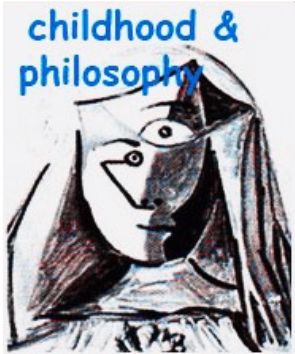the present and the future of doing philosophy with children
DOI:
https://doi.org/10.12957/childphilo.2023.78673Keywords:
childhood, philosophy for children, philosophy with children, adultism, childismAbstract
This paper is an introduction to the dossier on “the present and the future of doing philosophy with children”, which itself drew inspiration from a conference on the same topic that was held in University College Dublin on the 24th of June 2022. While the conference aimed at building a case for the importance of engaging pre-college students in philosophical thinking, it also aspired to function as a forum where the participants can critically reflect on the practice of doing philosophy with children. The participants were asked to reflect on 1) the ways in which philosophy prepares children to engage with an increasingly complex world; 2) the future challenges of the P4wC movement; 3) the ways in which and the extent to which P4wC practice contributes to the decolonization of childhood discourses; 4) the ways in which and the extent to which the philosophy with children initiative addresses issues of epistemic injustice and educational and social inequalities. Building on the discussions that took place during and after the conference, the authors in this dossier interrogate the hierarchical opposition between child and adult, and cast a critical gaze on adultist assumptions that prevent Philosophy for/with Children initiatives from achieving their full potential.
Downloads
References
Biswas, T. and Wall, J. (2023). Childist theory in the humanities and social sciences. Child Soc, 37: 1001-1004. https://doi.org/10.1111/chso.12738
Derrida, J. (2008). Marx and Sons. In Michael Sprinker (ed.) Ghostly Demarcations: A Symposium on Jacques Derrida's "Specters of Marx" (pp. 213-269). London: Verso.
Duhn, I. (2016). Speculating on childhood and time, with Michael Ende’s Momo (1973). Contemporary Issues in Early Childhood, 17(4), 377–386. https://doi.org/10.1177/1463949116677922
Goode, D. (1986). Kids, cultures, and innocents. Human Studies, 9, 85-106.
Haynes, J. & Murris, K. (2021). right under our noses: The postponement of children's political equality and the NOW. childhood & philosophy, 17, 1-21. https://doi.org/10.12957/childphilo.2021.55060
Kennedy, D. & Kohan, W. O. (2017). Childhood, Education, and Philosophy: A Matter of Time. In M. R. Gregory, J. Haynes, K. Murris (Eds.). The Routledge International Handbook of Philosophy for Children (pp. 46-52). London: Routledge.
Kennedy, D. (2010). Philosophical Dialogue with Children: Essays on Theory and Practice. The Edwin Mellen Press.
Kennedy, D. (2006). The Well of Being. Childhood, Subjectivity, and Education. Albany: SUNY Press.
Kohan, W. O. (2015). Childhood, Education and Philosophy: New Ideas for an Old Relationship. New York: Routledge.
Lipman, M. & Sharp, A. M. (1978). Some Educational Presuppositions of Philosophy for Children. Oxford Review of Education, 4(1): 85-90.
Lipman, M. (2003). Thinking in Education. Cambridge: Cambridge University Press.
Murris, K. S. (2008). Philosophy with children, the stingray and the educative value of disequilibrium. Journal of Philosophy of Education, 42(3-4), 667-685. https://doi.org/10.1111/j.1467-9752.2008.00640.x
Petr, C. G. (1992). Adultcentrism in Practice with Children. Families in Society, 73(7), 408–416. https://doi.org/10.1177/104438949207300703
Rollo, T. (2018). Feral Children: Settler Colonialism, Progress, and the Figure of the Child. Settler Colonial Studies, 8(1), 60-79.
Tesar, M., Farquhar, S., Gibbons, A., Myers, C. Y., & Bloch, M. N. (2016). Childhoods and time: Rethinking notions of temporality in early childhood education. Contemporary Issues in Early Childhood, 17(4), 359–366. https://doi.org/10.1177/1463949116677931
Vansieleghem, N. & Kennedy, D. (2011). Introduction: What is Philosophy for Children, what is Philosophy with Children: After Matthew Lipman?” Journal of Philosophy of Education, 45(2): 171–183.
Wall, J. (2019). From childhood studies to childism: Reconstructing the scholarly and social imaginations. Children’s Geographies 20(3), 257-270.
Weber, B. (2020). Child and Time: A Phenomenological Journey into the Human Conditions of Education. In W. O. Kohan and B. Weber (Eds.), Thinking, Childhood and Time. Contemporary Perspectives in the Politics of Education (pp. 31-50). New York: Lexington Books.
Wood, D. (2006). On being Haunted by the Future. Research in Phenomenology 36 (1), 274-298.
Young-Bruehl, E. (2012). Childism. Confronting Prejudice Against Children. Yale: Yale University Press.



